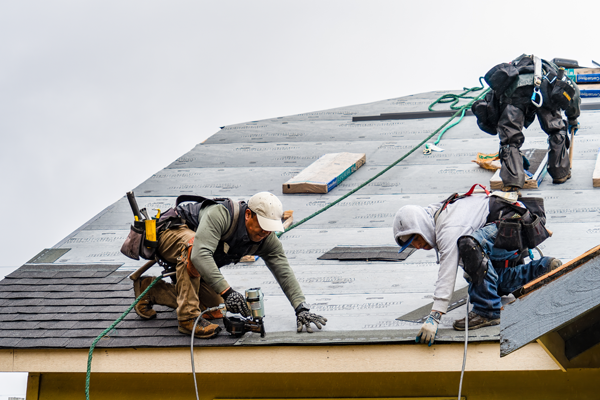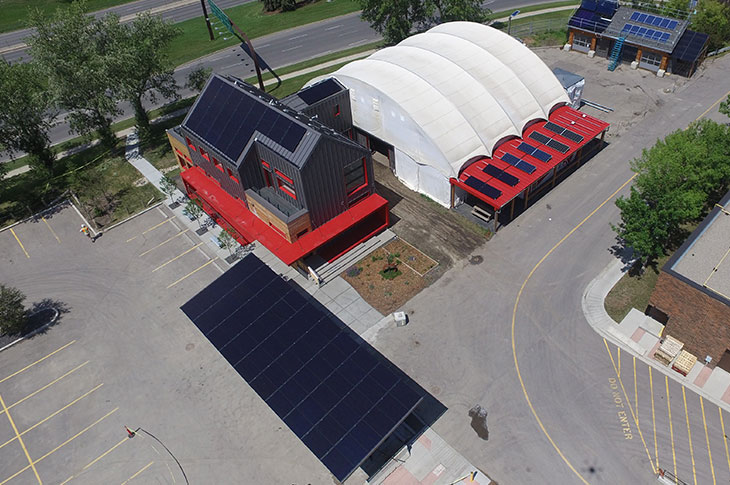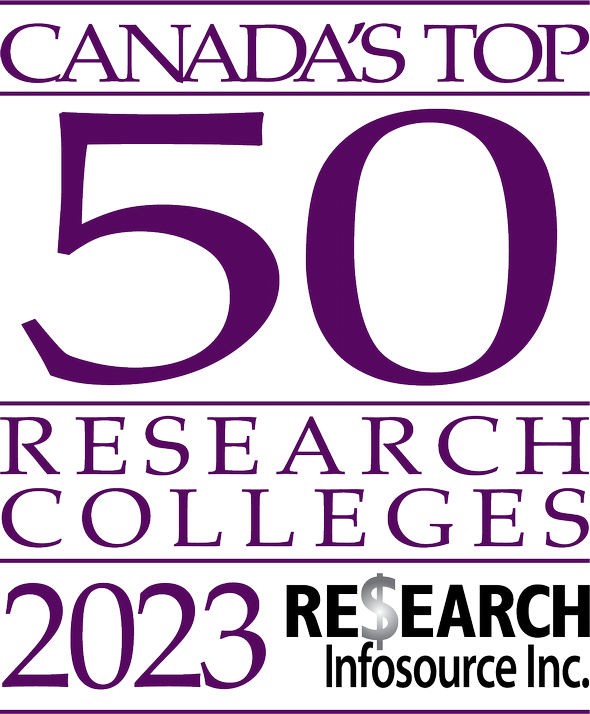Canada’s Changing Building and Energy Codes – Implications for Alberta’s Residential Real Estate Sector
This applied research project is a partnership with RFS Energy and involves creating resources for the Alberta Real Estate Foundation (AREF) to prepare the province's real estate sector for current and future building code changes.

Since 2008, the Green Building Technology Access Centre (GBTAC), one of the centres in the Applied Research and Innovation Services (ARIS) Hub, has been a key driver in advancing the Canadian construction and real estate sectors. Through various initiatives, GBTAC has addressed critical issues such as building energy efficiency, affordability, climate change, evolving building codes, regulations, and emissions.
RFS Energy Consulting & Research Group Inc.’s (RFS Energy) focus is to support local and national Greenhouse gas (GHG) emissions reduction efforts by pushing innovative research, concepts and plans into the market. To further these objectives, GBTAC has partnered with RFS Energy, with funding and strategic support provided by the Alberta Real Estate Foundation (AREF) Investment Grants program.
In partnership with RFS Energy, GBTAC played a pivotal role in identifying what the real estate industry needs to proactively address future challenges stemming from changing building codes and policies. After extensive research, resources were created to understand, prepare for and adapt to sweeping building code changes, as well as other regulatory mechanisms put in place to achieve municipal, provincial and federal net-zero targets in the built environment.
The real estate industry will have a major responsibility as new building codes are enforced and will play a key role in decarbonization efforts. However, the residential real estate sector’s needs, especially for real estate professionals, have been overlooked in terms of education and awareness of energy literacy, policy changes, and code compliance. Now, as new codes are being developed, it’s crucial to create and share resources to support and future-proof the real estate industry.
Piya Kaluthantirige
Principal Investigator, GBTACKey SAIT contributions
Over the course of 16 months, GBTAC collaborated with RFS Energy to progress from initial research to identifying key resources for the real estate industry in preparation for upcoming code and regulatory changes. This includes:
- Conducting research and analysis to identify gaps within Alberta’s real estate industry.
- Developing tailored resources for AREF to make informed decisions.
Research and analysis
The first phase of this project focused on research and analysis to identify key challenges the real estate industry may face with upcoming building code changes. Through in-depth studies and consultations, three primary needs emerged within the real estate industry.
- Building awareness: there is significant demand for education and capacity development among professionals to help them stay informed on emerging trends and changes.
- Knowledge assessment: real estate professionals need appropriate knowledge to evaluate impacts and potential liabilities to navigate conversations with their clients on emerging trends.
- Access to tailored resources: it’s crucial to provide customized resources that enable informed decision-making.
It was important to conduct research specific to Alberta's real estate sector to provide up-to-date and relevant information on regulatory changes, industry trends, and best practices. GBTAC also engaged stakeholders to gather insights, feedback, and support for the initiative.
Development of educational materials
To support Alberta’s real estate industry in adapting to upcoming building code changes, the development of educational materials and disseminating the codes knowledge with the sector via workshops are crucial steps. These resources bridge the knowledge gap by providing clear, actionable guidance tailored to industry professionals. The goal is to provide the tools to effectively implement changing codes and policies.
Resources developed:
- Guidelines: to help professionals understand the updated codes and their implications for both new and existing homes.
- Educational materials: training resources, including workshops for real estate licensees, in collaboration with industry organizations
Working towards Calgary's 2050 Net-zero emission goals
The City of Calgary has set goals of:
- 60% reduction in greenhouse gas (GHG) emissions below 2005 levels by 2030.
- Net-zero GHG emissions by 2050.
We're working to help them achieve that.
Project timeline
January – November 2024: Deepen research
Research on the impacts of new codes for new and existing residential sector buildings.
August 2024 – present: Development of tools and resources
Development of tools and resources to transform research into meaningful and easy-to-understand information.
Upcoming developments
April 2025 – June 2025: Share findings
Share and disseminate project findings via various communication channels.
Three workshops will be held between April and June 2025, and they are intended to provide valuable information and/or training for the Alberta real estate and construction industries. These workshops will highly benefit real estate professionals in Alberta, along with professionals in the trades and construction industry.
The workshops will be in partnership with the Biosphere Institute of the Bow Valley and the City of Calgary and utilize the shared funding coming from both AREF investment grants and Code Accelerator funds from Natural Resources Canada (NRCan).
About RFS Energy
With over 50 years of combined experience working with utilities and government agencies across Canada, their team draws from on-the-ground implementation expertise to support national and local GHG emissions reduction efforts. By building relationships and connecting innovative researchers, concepts, and target-driven organizations, RFS Energy helps bring innovation to life.
Thanks to the team
- Melanie Ross, Research Chair, GBTAC
- Piya Kaluthantirige, Principal Investigator, GBTAC
- Alexandra Kodyra, Research Associate, GBTAC
- Leo Lu, Research Assistant, GBTAC
- Justin Pockar, Strategy Advisor, GBTAC

Green Building Technology Access Centre
Our centre focuses on identifying and developing environmentally friendly technologies, processes, programs, systems, and services that will fundamentally change how we build, educate and develop skilled labour.
Partner with us
 Our expert researchers, equipment, and facilities support business planning, product design and development, fabrication and prototyping, product testing, and technology verification, culminating in industry education and public outreach.
Our expert researchers, equipment, and facilities support business planning, product design and development, fabrication and prototyping, product testing, and technology verification, culminating in industry education and public outreach.

Oki, Âba wathtech, Danit'ada, Tawnshi, Hello.
SAIT is located on the traditional territories of the Niitsitapi (Blackfoot) and the people of Treaty 7 which includes the Siksika, the Piikani, the Kainai, the Tsuut’ina and the Îyârhe Nakoda of Bearspaw, Chiniki and Goodstoney.
We are situated in an area the Blackfoot tribes traditionally called Moh’kinsstis, where the Bow River meets the Elbow River. We now call it the city of Calgary, which is also home to the Métis Nation of Alberta.